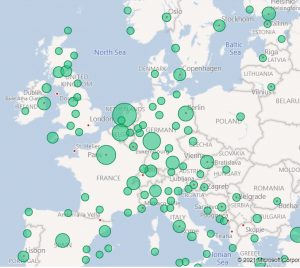King’s Climate Action Network (King’s CAN) has been presenting some of their work over the past few weeks, through their exhibition and across King’s Sustainability social media.
What is King’s CAN?
King’s CAN is an open, interdisciplinary forum to support King’s commitment to be net-zero carbon by 2025. It brings together individuals with expertise in particular topics or simply a passion for sustainability from across the King’s community to create a zero-carbon strategy for the university.
Working across eleven key impact areas, from energy consumption to research and education, the seven sub-groups aim to propose solutions, create positive impact and engage the King’s community around climate action. The network is aiming to collate a net-zero carbon strategy by summer 2021 – in the meantime, here’s a little summary of what each sub-group has been working on:
Procurement and Waste cover everything from our food to IT and lab supplies. In 2018/2019, emissions from procurement were over 85,000 tonnes of CO2 (compared to 30,552 tonnes from scope 1 and 2 emissions from fuels and electricity – read more about different emission categories here). Almost 90% of these emissions come from our supply chain, meaning that they are indirect emissions, which makes reducing them even more challenging!
The procurement and waste sub-group have accepted this challenge and are working in collaboration with the Procurement team, King’s Food and other parts of King’s to better understand how we can reduce our emissions and waste.
King’s has fully divested from all fossil fuels 2 years ahead of schedule! The Responsible Investment sub-group is now working to take this further and use our influence to encourage staff pension funds to invest more responsibly. In addition, they have collaborated with Students Organising for Sustainability (SOS)–UK to review practice and policy across the sector and create a new version of the King’s Investment Policy.
On a national level, the built environment contributes to approximately 40% of our total carbon footprint. Although our heritage and listed campus buildings present a particularly significant challenge, King’s is currently working on a Heat De–carbonisation Plan that will map the current energy usage of each estate and put forward ways to reduce or de–carbonise buildings to help meet the challenge of net zero by 2025.
Focusing on two key aspects of travel, business travel and daily commuting, the Travel sub-group is working on identifying ways we can shift our travel patterns to reduce travel-related emissions.
Air travel represents our second biggest scope 3 emissions, after procurement. King’s must encourage virtual meetings when possible and train-travel for close-by destinations, as well as communicate this information to staff and students, and provide guides on how to book the least impactful modes of travel for each required trip.
This sub-group seeks to highlight the fascinating research on climate and sustainability already taking place at King’s by collating projects into an online ‘Climate Action Hub.’ In addition to this, they want to encourage interdisciplinary research, to ensure students and staff are aware of the ways they can take action, as well as create opportunities for students to conduct their own research on sustainability.
“Education is the core of what we do at King’s. […] We have the opportunity to reach everyone at King’s and give them tools to think about the challenges of climate change, how to tackle it and take it to a much wider audience when they leave King’s” (Oli, sub-group member, Senior Technical Officer and Founder of King’s Community Garden).
The Students and Education sub-group is dedicated to the issue of climate education. They are taking an active role in guiding the university on the best ways to embed sustainability within the curriculum, across all faculties to educate the community as well as provide opportunities to develop practical skills for climate action.
“Climate change policies should not perpetuate existing socio-economic inequalities. In order to prevent this from occurring, we cannot start with top-down government policy” (Abigail, sub-group member, BSc Global Health and Social Medicine student and Co-Founder of King’s 4 Change)
Acting on the climate crisis requires coming together as a collective and creating space for conversations that include diverse ideas and experiences. The Community and Engagement sub-group is seeking to centre these ideas throughout all of King’s climate action. Indeed, as a higher education institution, King’s must provide a meeting place for communities, as well as listen to the needs and challenges of our local communities, share our findings, experience and expertise, and support community initiatives.
King’s CAN is open to everyone from the King’s Community – students, staff and alumni. If you’d like to get involved in tackling these important issues, King’s CAN would love to hear from you!


